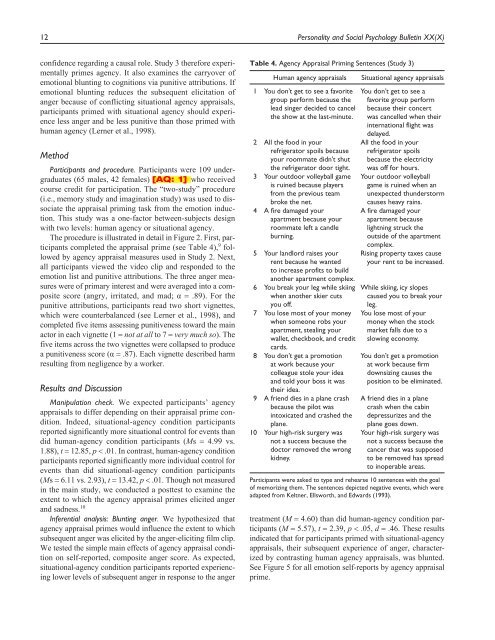The Role of Cognitive Appraisals in Emotional Blunting - Projects at ...
The Role of Cognitive Appraisals in Emotional Blunting - Projects at ...
The Role of Cognitive Appraisals in Emotional Blunting - Projects at ...
Create successful ePaper yourself
Turn your PDF publications into a flip-book with our unique Google optimized e-Paper software.
12 Personality and Social Psychology Bullet<strong>in</strong> XX(X)confidence regard<strong>in</strong>g a causal role. Study 3 therefore experimentallyprimes agency. It also exam<strong>in</strong>es the carryover <strong>of</strong>emotional blunt<strong>in</strong>g to cognitions via punitive <strong>at</strong>tributions. Ifemotional blunt<strong>in</strong>g reduces the subsequent elicit<strong>at</strong>ion <strong>of</strong>anger because <strong>of</strong> conflict<strong>in</strong>g situ<strong>at</strong>ional agency appraisals,participants primed with situ<strong>at</strong>ional agency should experienceless anger and be less punitive than those primed withhuman agency (Lerner et al., 1998).MethodParticipants and procedure. Participants were 109 undergradu<strong>at</strong>es(65 males, 42 females) [AQ: 1] who receivedcourse credit for particip<strong>at</strong>ion. <strong>The</strong> “two-study” procedure(i.e., memory study and imag<strong>in</strong><strong>at</strong>ion study) was used to dissoci<strong>at</strong>ethe appraisal prim<strong>in</strong>g task from the emotion <strong>in</strong>duction.This study was a one-factor between-subjects designwith two levels: human agency or situ<strong>at</strong>ional agency.<strong>The</strong> procedure is illustr<strong>at</strong>ed <strong>in</strong> detail <strong>in</strong> Figure 2. First, participantscompleted the appraisal prime (see Table 4), 9 followedby agency appraisal measures used <strong>in</strong> Study 2. Next,all participants viewed the video clip and responded to theemotion list and punitive <strong>at</strong>tributions. <strong>The</strong> three anger measureswere <strong>of</strong> primary <strong>in</strong>terest and were averaged <strong>in</strong>to a compositescore (angry, irrit<strong>at</strong>ed, and mad; α .89). For thepunitive <strong>at</strong>tributions, participants read two short vignettes,which were counterbalanced (see Lerner et al., 1998), andcompleted five items assess<strong>in</strong>g punitiveness toward the ma<strong>in</strong>actor <strong>in</strong> each vignette (1 not <strong>at</strong> all to 7 very much so). <strong>The</strong>five items across the two vignettes were collapsed to producea punitiveness score (α .87). Each vignette described harmresult<strong>in</strong>g from negligence by a worker.Results and DiscussionManipul<strong>at</strong>ion check. We expected participants’ agencyappraisals to differ depend<strong>in</strong>g on their appraisal prime condition.Indeed, situ<strong>at</strong>ional-agency condition participantsreported significantly more situ<strong>at</strong>ional control for events thandid human-agency condition participants (Ms 4.99 vs.1.88), t 12.85, p .01. In contrast, human-agency conditionparticipants reported significantly more <strong>in</strong>dividual control forevents than did situ<strong>at</strong>ional-agency condition participants(Ms 6.11 vs. 2.93), t 13.42, p .01. Though not measured<strong>in</strong> the ma<strong>in</strong> study, we conducted a posttest to exam<strong>in</strong>e theextent to which the agency appraisal primes elicited angerand sadness. 10Inferential analysis: Blunt<strong>in</strong>g anger. We hypothesized th<strong>at</strong>agency appraisal primes would <strong>in</strong>fluence the extent to whichsubsequent anger was elicited by the anger-elicit<strong>in</strong>g film clip.We tested the simple ma<strong>in</strong> effects <strong>of</strong> agency appraisal conditionon self-reported, composite anger score. As expected,situ<strong>at</strong>ional-agency condition participants reported experienc<strong>in</strong>glower levels <strong>of</strong> subsequent anger <strong>in</strong> response to the angerTable 4. Agency Appraisal Prim<strong>in</strong>g Sentences (Study 3)Human agency appraisals1 You don’t get to see a favoritegroup perform because thelead s<strong>in</strong>ger decided to cancelthe show <strong>at</strong> the last-m<strong>in</strong>ute.2 All the food <strong>in</strong> yourrefriger<strong>at</strong>or spoils becauseyour roomm<strong>at</strong>e didn’t shutthe refriger<strong>at</strong>or door tight.3 Your outdoor volleyball gameis ru<strong>in</strong>ed because playersfrom the previous teambroke the net.4 A fire damaged yourapartment because yourroomm<strong>at</strong>e left a candleburn<strong>in</strong>g.5 Your landlord raises yourrent because he wantedto <strong>in</strong>crease pr<strong>of</strong>its to buildanother apartment complex.6 You break your leg while ski<strong>in</strong>gwhen another skier cutsyou <strong>of</strong>f.7 You lose most <strong>of</strong> your moneywhen someone robs yourapartment, steal<strong>in</strong>g yourwallet, checkbook, and creditcards.8 You don’t get a promotion<strong>at</strong> work because yourcolleague stole your ideaand told your boss it wastheir idea.9 A friend dies <strong>in</strong> a plane crashbecause the pilot was<strong>in</strong>toxic<strong>at</strong>ed and crashed theplane.10 Your high-risk surgery wasnot a success because thedoctor removed the wrongkidney.Situ<strong>at</strong>ional agency appraisalsYou don’t get to see afavorite group performbecause their concertwas cancelled when their<strong>in</strong>tern<strong>at</strong>ional flight wasdelayed.All the food <strong>in</strong> yourrefriger<strong>at</strong>or spoilsbecause the electricitywas <strong>of</strong>f for hours.Your outdoor volleyballgame is ru<strong>in</strong>ed when anunexpected thunderstormcauses heavy ra<strong>in</strong>s.A fire damaged yourapartment becauselightn<strong>in</strong>g struck theoutside <strong>of</strong> the apartmentcomplex.Ris<strong>in</strong>g property taxes causeyour rent to be <strong>in</strong>creased.While ski<strong>in</strong>g, icy slopescaused you to break yourleg.You lose most <strong>of</strong> yourmoney when the stockmarket falls due to aslow<strong>in</strong>g economy.You don’t get a promotion<strong>at</strong> work because firmdownsiz<strong>in</strong>g causes theposition to be elim<strong>in</strong><strong>at</strong>ed.A friend dies <strong>in</strong> a planecrash when the cab<strong>in</strong>depressurizes and theplane goes down.Your high-risk surgery wasnot a success because thecancer th<strong>at</strong> was supposedto be removed has spreadto <strong>in</strong>operable areas.Participants were asked to type and rehearse 10 sentences with the goal<strong>of</strong> memoriz<strong>in</strong>g them. <strong>The</strong> sentences depicted neg<strong>at</strong>ive events, which wereadapted from Keltner, Ellsworth, and Edwards (1993).tre<strong>at</strong>ment (M 4.60) than did human-agency condition participants(M 5.57), t 2.39, p .05, d .46. <strong>The</strong>se results<strong>in</strong>dic<strong>at</strong>ed th<strong>at</strong> for participants primed with situ<strong>at</strong>ional-agencyappraisals, their subsequent experience <strong>of</strong> anger, characterizedby contrast<strong>in</strong>g human agency appraisals, was blunted.See Figure 5 for all emotion self-reports by agency appraisalprime.
















